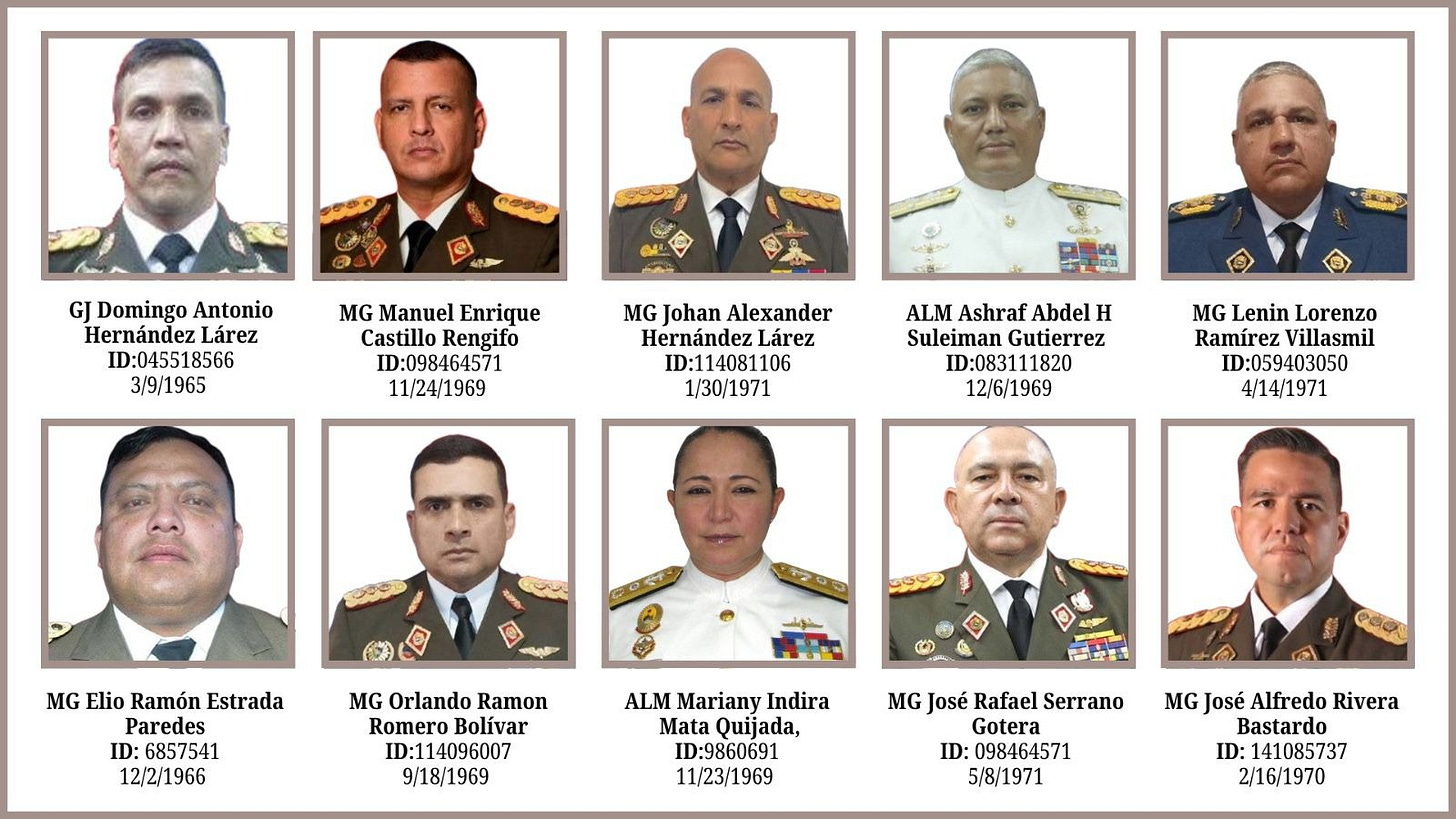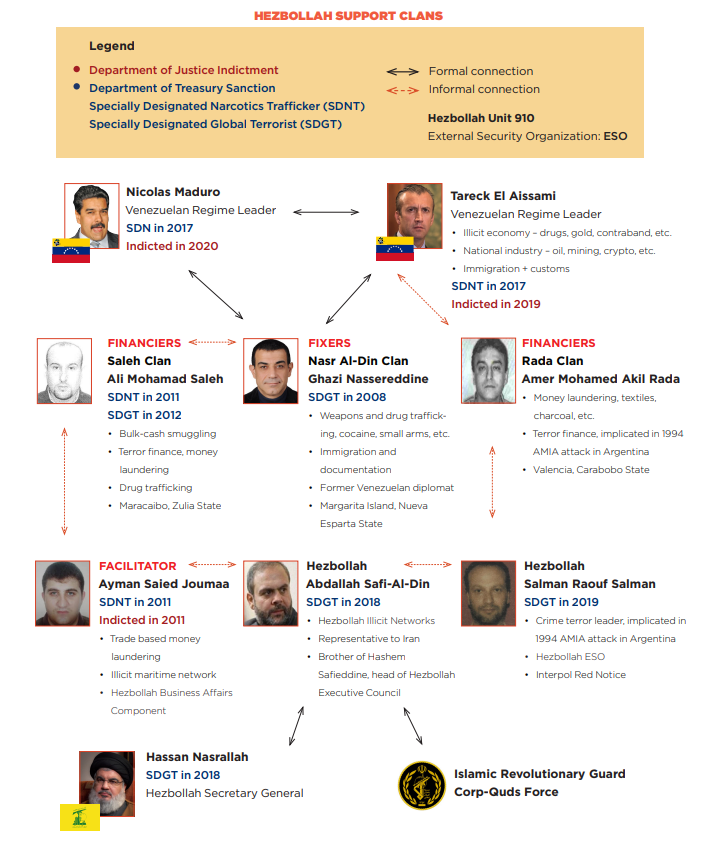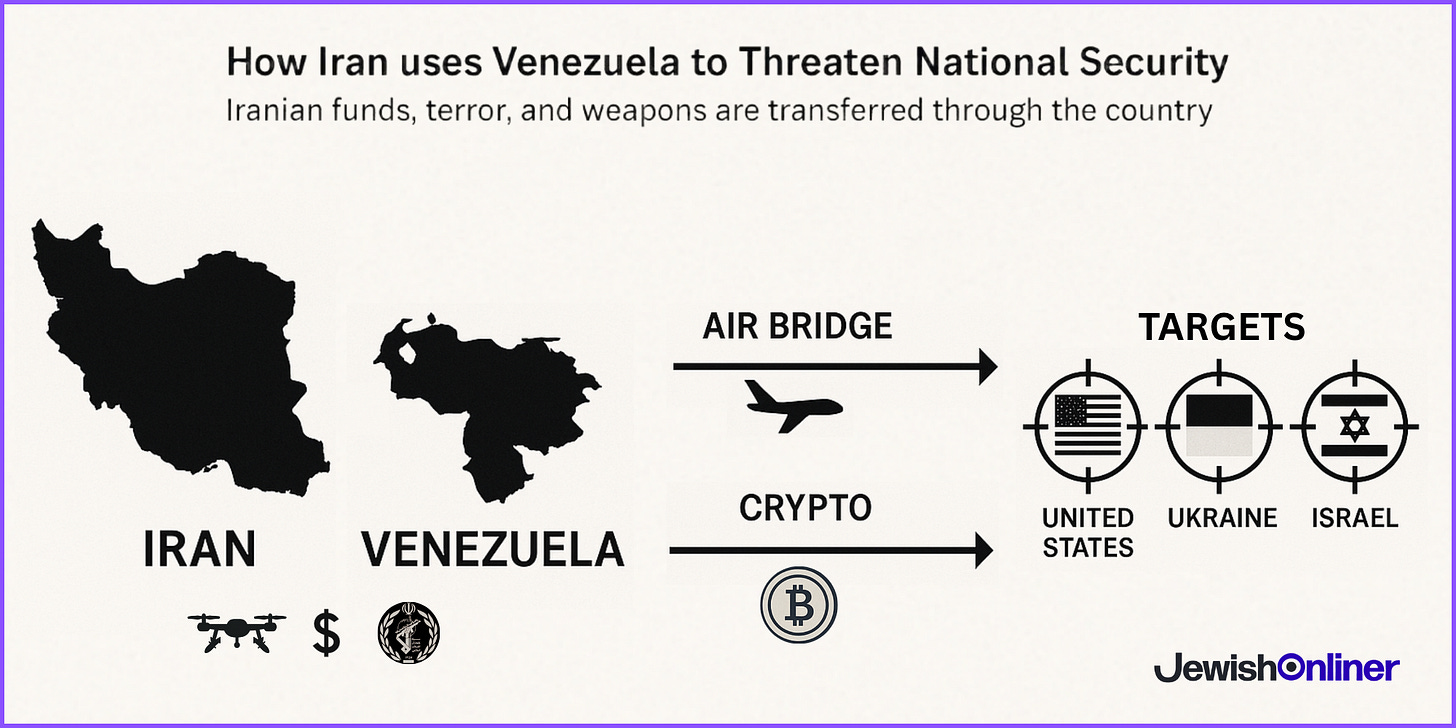Iran's Hidden War Machine in Venezuela: A Threat to National Security
An exclusive new Jewish Onliner report sheds light on Iran's drone factories, Hezbollah networks, and sanctions-evading cryptocurrency operations just hours from American shores in Venezuela
While Israel and Iran exchanged missile strikes during the 12-Day War, Iranian weapons manufacturers were busy at work—not in Tehran, but at a Venezuelan military airbase just 1,400 miles from Miami, producing the same drones Russia fires at Ukrainian cities and Iran launches at Israel.
The scene at Iran's Caracas embassy last month suddenly takes on far more sinister implications. More than 15 senior Venezuelan military commanders gathered with Iranian Ambassador Ali Chegini while their ally remained officially at war with Israel—not for diplomatic pleasantries, but to coordinate its longstanding operational alliance that has transformed Venezuela into Iran's primary staging ground for projecting power throughout the Western Hemisphere.
These facts, compiled and summarized through extensive investigation, accompany a comprehensive report that Jewish Onliner is releasing today, documenting the full scope of Iran-Venezuela cooperation and its direct threats to U.S. national security.

The Hidden War Machine
At El Libertador Air Base in Maracay, Venezuela, Iranian firms including Qods Aviation— an Islamic Revolutionary Guard Corps (IRGC) front company sanctioned by the U.S. government — have established what is effectively Iran's first military-industrial export node in the Western Hemisphere. Venezuelan military personnel now operate advanced Shahed-131 drone production lines under direct Iranian supervision, manufacturing the same weapons systems that have terrorized Ukrainian civilians and that Iran launched by the hundreds against Israeli cities.
This isn't symbolic cooperation—it's active weapons manufacturing on American soil's doorstep. The Strategic Operational Commander of the Venezuelan Army, General Hernández Lárez, who posed alongside Ambassador Chegini at the embassy gathering, directly oversees these Iranian-supervised military operations. Iran has invested billions in Venezuelan defense infrastructure, transforming what began as commercial agreements into a sophisticated weapons production and export hub targeting Latin America.

The timing of last month’s embassy meeting—occurring while Iran's missiles were still smoking in Israeli impact craters—reveals the operational nature of this alliance. After exhausting much of its missile arsenal in attacks against Israel, Iran appears to have turned to its closest hemispheric partner not just for diplomatic support, but for concrete military resupply and strategic coordination.
But the weapons manufacturing is just one component of a broader threat system that spans financial networks, infiltration operations, and logistics corridors designed to project Iranian power throughout the hemisphere.
The Digital Financial Underground
What makes this partnership particularly dangerous is how Iran and Venezuela have pioneered sophisticated financial mechanisms to circumvent international sanctions. Venezuela launched the world's first national cryptocurrency, the Petro, specifically designed to evade U.S. financial restrictions and facilitate transactions with sanctioned regimes like Iran.
This crypto-financial critical infrastructure enables Iran to fund its Venezuelan operations, including weapons manufacturing and intelligence networks, through digital channels that bypass traditional banking systems. Maduro has increasingly turned to cryptocurrencies to mitigate the impact of U.S. sanctions, creating what amounts to a parallel financial system for sanctioned regimes.
Iran, which has announced a national imperative to mine Bitcoin and licensed numerous cryptocurrency operations, uses this digital infrastructure to facilitate payments for military equipment, operational expenses, and proxy networks throughout Latin America. This cryptocurrency nexus represents a dangerous potential for sanctions evasion that traditional financial monitoring systems struggle to detect.
The Infiltration Network
Venezuela serves as Iran's geographic and institutional gateway into Latin America, providing permissive state infrastructure for Tehran to project power with minimal risk of interdiction. This infrastructure has enabled systematic penetration of hemispheric security through sophisticated identity laundering operations funded through cryptocurrency channels.
Venezuelan officials have facilitated passport fraud schemes allowing Hezbollah-linked operatives to obtain legitimate Venezuelan documentation, enabling covert entry into North America under Venezuelan identities. These operations are increasingly funded through digital currencies that leave minimal traditional financial trails.
The architect of much of this penetration is Tareck El Aissami, a Venezuelan politician of Syrian-Lebanese descent whom the U.S. Treasury designated as a narcotics "kingpin." Widely recognized as Iran's closest ally in Caracas, El Aissami has managed petroleum exports through Iranian channels while operating passport fraud schemes involving the sale of Venezuelan documents to Hezbollah operatives and other extremist groups.
Another key figure, Ghazi Nasr al-Din, exemplifies the sophisticated nature of this network. This Lebanese-Venezuelan diplomat leveraged his official position as a Venezuelan envoy in the Middle East to raise funds for Hezbollah and facilitate the movement of Iranian supporters into Venezuela. Designated by the U.S. for terrorism in 2015, Nasr al-Din remains an FBI-wanted individual who demonstrates how Iranian influence agents have secured Venezuelan official credentials to enable covert operations throughout the Americas.

The Underground Railroad
The operational alliance extends far beyond embassy meetings through sophisticated logistics networks that systematically evade international sanctions. Iran operates a Tehran-Caracas air corridor using Mahan Air, a sanctioned Iranian airline with direct IRGC ties, working in coordination with Venezuela's Conviasa airline.
In 2021, Mahan Air transferred jumbo jets directly to Venezuelan control, effectively embedding Iranian aviation assets within Venezuela's civilian fleet. Intelligence sources report these aircraft consistently use cargo facilities rather than passenger terminals, with unmanifested pallets being discreetly offloaded—operations characteristic of sensitive military or dual-use cargo transfers under civilian aviation cover.
This air corridor functions as a significant sanctions-evasion mechanism, enabling the covert transfer of advanced military components, financial instruments, and operatives between Tehran and Caracas while maintaining plausible civilian cover. Payment for these operations increasingly flows through cryptocurrency channels that evade traditional sanctions enforcement.
Terror Networks and Digital Financing
The Iran-Venezuela alliance has created concrete, immediate threats to U.S. security through both physical and financial means. Hezbollah operatives, operating under Venezuelan military and intelligence protection, have integrated into major narcotrafficking networks including the "Cartel of the Suns." These operations simultaneously fund Iran's global terror apparatus while contributing to drug crises devastating American communities.
The operational nature of Iran's Venezuelan presence became starkly apparent in 2021 when the FBI charged four Iranian intelligence operatives with plotting to abduct a U.S.-based Iranian dissident. Their plan involved forcibly transporting the target via maritime routes to Venezuela, demonstrating Iran's use of Venezuelan territory as a safe haven for hostile operations against U.S. persons.
An Urgent National Security Threat
The full scope of these threats — as detailed in Jewish Onliner's comprehensive report — reveals a coordinated, multi-domain alliance that represents a significant challenge to U.S. national security in the Western Hemisphere.
The question isn't whether Iran poses a threat in Latin America—it's whether the United States will recognize and respond to the clear and present danger that has already taken root in Venezuela before it metastasizes throughout the Western Hemisphere. The weapons factory in Maracay is just the beginning.




